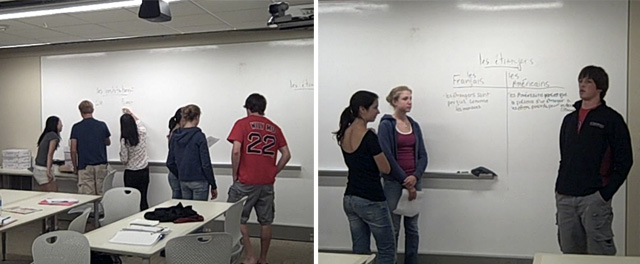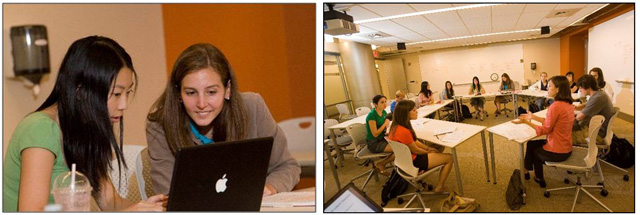Deb Reisinger, Romance Studies
As a fellow in CIT’s Flexible Learning Spaces Fellowship (2008), Deb Reisinger participated in meetings, mini-workshops, and other fellowship activities centered around the concept of ‘flexible learning’ – specifically focused on the uses of the technology and space arrangements made possible by Duke’s new teaching and learning space, the Link.
Course overview
During Fall 2008, Reisinger taught two sections of a French course called Cultural and Literary Perspectives in the Link (one section in Classroom 3, and the other in Seminar room 1). The following lists Reisinger’s core goals of the course(s):
- Improved writing skills through collaborative learning/peer editing (in particular, the development of critical thinking skills in relation to cultural analysis)
- Improved reading comprehension skills in order to move through program and read independently at higher levels
- Nuanced understanding of cultural differences (notable in group exchanges and class discussions, assessed via oral presentations and written papers)
- More precise oral production of language, both in accuracy and in analysis
Uses of technology and flexible learning spaces
- Students created wikis to house assignments over the course of the semester. The flexible learning spaces allowed students to work collaboratively on editing these assignments during class breakout sessions.
- The classroom space, combined with on-site technology check-out and support, allowed students to receive training in their classroom, rather than in a language lab. Using technology became more fluid and integrated into course pedagogy.
- Student presentations were enhanced by easier student access to technology (video, on-site computer), which is often stalled by technological difficulties.
- Reisinger used the learning spaces to show video and project images in addition to writing on the whiteboards. Students were able to use projectors to display follow-up to group work from multiple laptops.
- Multiple whiteboards made classroom learning more student-centered. Groups were better able to better demonstrate their analysis by mapping out and displaying their work on the whiteboards.
Students working in groups
“As a warm-up, we began class by identifying projected images on one of the room’s white boards (paintings, literary titles, photos). Students then broke into small groups to generate lists of well-known French intellectuals on the board; follow up discussion included the collective creation of a definition of an intellectual,. We then returned to our seminar table (shaped like a pentagon today, which they seemed to like) and we related how their definition matched that put forth by the author of the article they had prepared, called “The Death of French Culture.” Students then worked in pairs to briefly summarize the article’s arguments, accessing the article on their laptops. In a follow-up discussion, a student secretary listed pair findings on the board, and we closed with a whole group debate about on the article’s conclusions. It was more or less a typical day, but shows how the classroom facilitates this type of classroom dynamic: it’s easy to get students writing as groups on multiple boards, to move from groups to seminar-type and back again, and to blend technology into traditional forms of classroom discussions.”
Using the Blackboard wiki
Reisinger discovered that a large benefit of teaching in the Link came from the flexibility offered by the ability to bring technology in and out of the classroom as needs be.
“This was something we used to have to go to the language lab for, but this time around, Erin rolled in a laptop cart and we were able to work right in our classroom space. The wireless was a bit slow, but I really enjoyed not having to displace the class to do this training. For me, it makes technology a part of the class and not something extra we have to go somewhere to do.”
The following video features Reisinger briefly explaining her use of wikis in her courses:




